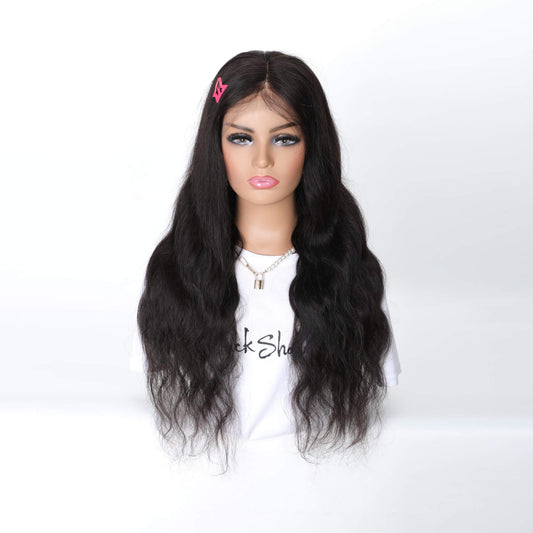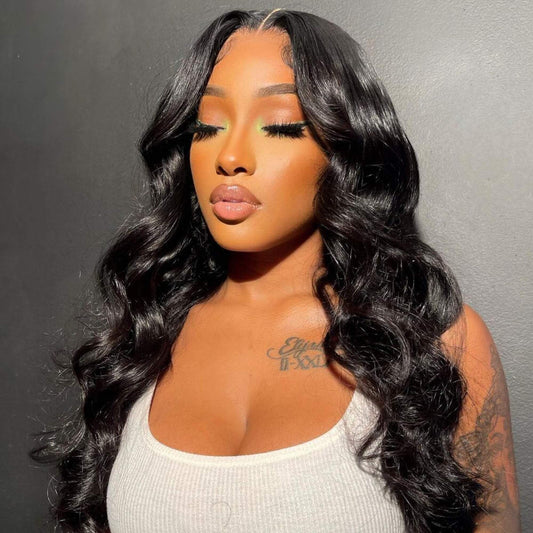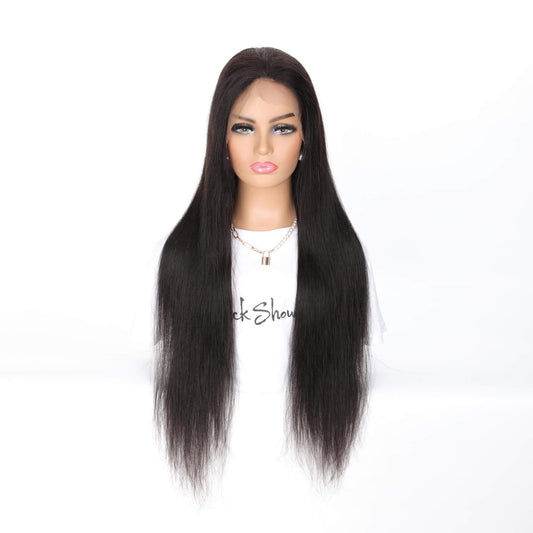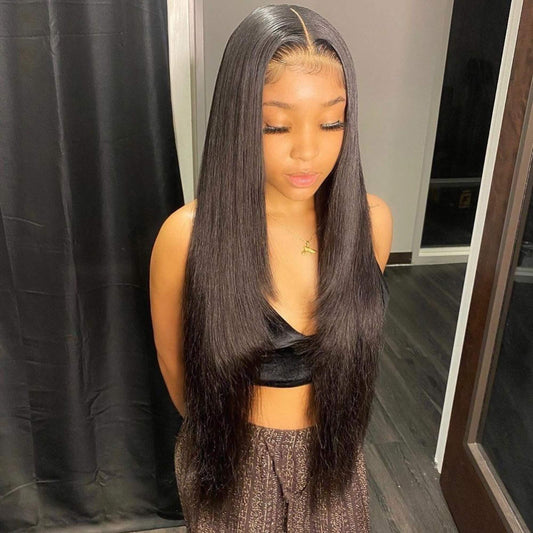The Ultimate Hair Guide For A First Time Buyer
So you've decided to take the plunge and buy your first set of hair bundles! Go, girl!
Navigating through various hair vendors and hair resellers can be a stressful experience due to having so many options. We know, its overwhelming and we are here to help!
We've put together all the information you will need before purchasing your first set of hair extensions! We want you to fill confident and knowledgeable about your first purchase, learn proper hair extensions care techniques, as well as keeping your hair looking as healthy as it can be while wearing your extensions.
So let’s get started!
What Are The Different Type Of Hair Extensions?
When looking for hair extensions, you will need to decide on rather you want human hair or synthetic hair.
What are the different types of extensions is such a common question for first-time buyers? It is a common question that can be quickly answered as well.
Synthetic or human hair, yes that simple!
Hair extensions are bought to enhance your natural hair, provide thicker fuller looks adding versatility. Whatever style you do choose, knowing what type of hair going into your extensions will ultimately help you choose the best for you - and we have you covered with everything you’ll need to know regarding different types of hair extensions used.
Synthetic Hair and What You Need To Know
Made from fine fibers consisting of polyester, acrylic, and plastic, synthetic strands are made using the technique of heating the material and stringing them together to create individual hair like fibers.
Like human hair, there are various levels of quality. With the ever, evolving technology synthetic hair has come a long way and looks more real like never before. Unlike human hair, synthetic hair cannot be colored or have excessive heat placed on them.
Human Hair And What You Need To Know

Brazilian Hair
Brazilian hair is the most popular hair texture; reason being is because it is most versatile because of the density, softness, and ability of longevity when taking care of. When maintained you can easily get many installs and coloring. Brazilian hair is suited for any style and comes in numerous natural colors. Brazilian hair is less likely to frizz, which is a massive plus in humid climate. Another benefit is the ability to achieve a fuller look with fewer bundles. If you're stuck on what texture to use, go with Brazilian, you can not go wrong!
Peruvian Hair Extensions
Peruvian hair is known for its coarseness and offering the thicker texture, although it is pretty light. Peruvian hair easily blends due to offering various textures in its natural state; straight, wavy, and curly. Because of the thickness, it requires fewer bundles to give a full look as well! Peruvian hair is a luxurious mixture of Brazilian texture and the smooth softness of European hair.
Malaysian Hair Extensions
A downfall is that color options are limited with Malaysian hair; it ranges on the darker side on the color spectrum. Malaysian hair also has more sheen than other textures that some are not a fan of. No worries, after a few washes, the shininess and sheen reduce and looks more natural. Malaysian hair also holds curls very well and tends to be softer and silkier vs. the other hair textures.
Indian Hair Extensions
Indian hair is known for its airy and light feel. Indian hair extensions also create natural waves that range very straight to curly. This hair curls easily, but the curls will lightly loosen slightly when in damp and humid weather. These extensions also offer a vast range of versatility in your styling options. If you need a natural wavey style, then this extension texture is the hair for you. Indian hair also does not tangle, shed much, or lose its natural wave.
Let’s Talk About Hair Textures!
Curly Hair Texture
Curly hair is full and thick, offering a luxurious bounce. Curly textures are easy to maintain, due to the lack of necessity to having to style your curly hair. The endless options of curly hair make this texture ideal for any newbie!
Straight Texture Hair Extensions
With straight hair, the cuticles are always intact. Straight hair is easy to style and maintain, but also gives you the option of wearing it as is.
Body Wave Hair Extensions
Body wave hair extensions offer a natural "S" shape in a cohesive pattern through the entire bundle. Body waves also have a shiny appearance. There's no special maintenance needed for this texture, and it offers no tangling, no shedding when taken care of properly.
Loose Wave Hair Extensions
Loose waves have a natural, flexible, spiral-like wave pattern. When compared to body wave hair extensions, the curl pattern is a bit smaller and tighter.
Single Weft Or Double Weft?
The main difference between a double and single weft hair extension is the thickness and density of the single track. As the name indicates, individual wefts consist of one layer, unlike the double weft which offers a double layer!
Both are useful, although not everyone can benefit from a double weft. This all depends on how much hair you will need for the look you’re going for.
If your hair is already medium to thick a single weft is all you will need to give your look the fullness you’re looking for. On the other hand, if your hair is thin, then a double weft is the perfect match for you. Choosing the correct hair extension thickness is vital to give the rights amount of fullness it needs.
What Type Of Extensions Are You Looking For?

Clip In Extensions
These come in a strand of shaped piece attached at the base with clips. Clip in extensions snaps open and close easily.
Tape-In Extensions
Tape ins are pre-tape together and then placed on both sides of your hair.
Sew In Hair Extensions
These extensions are sewn onto a braid or hair net using a curved needle and thread.
Pre-Bonded or Fusion Extensions
Using an adhesive glue, these extensions are fused or bonded to your hair.
Wig & Hair Pieces:
They come in multiple forms and are applied on top of your hair. Long full wigs are made to cover the entire head including “lace fronts.” Hairpieces are shaped into, buns or ponytails.
How To Find Your Right Color!

Finding your color online or instore will most likely be the most challenging task because a photo or packaging can show the extensions a bit lighter or darker than the actual color. When looking for a supplier to ensure that they have a color chart and categorize what shade you may fall into to make the process easier for you.
Black
Jet Black
Darkest shade
Pure black
Comparable to hair dyed black
Blue undertones
Off Black
Natural black color, not dy
Warm brown undertones
When your hair usually looks black but sometimes looks dark brown in the sun
Brown
Mocha Brown
The darkest shade of brown
Dark rich brown color
Red undertones
Noticeable brown color
Dark Brown
Mid-tone brown
Warm undertones
Not as red as Mocha Brown
Chocolate Brown
Full warm golden and red undertones
Slightly lighter than dark Brown
Chestnut Brown
The lightest shade of brown
Warm golden brown with honey and caramel undertones
Can blend with some ash brown colors
Blondes
Dirty Blonde
Darkest blonde
Wheat hues
Lots of golden and brown undertones
Blends with most natural blonde shades
Bleach Blonde
A bright blonde color
A lot of warm golden undertones
Ash Blonde
Similar to bleach blonde
Ash undertones
Not platinum blonde but can be toned
Platinum Blonde
The lightest shade of blonde
Silver undertones
Can be toned to achieve white or grey/ silver hair
Red
Auburn
Darkest Red
Deep burgundy red color
A mixture of Siena and firebrick undertones
Strawberry Blonde
Lightest red shade
A mixture of red and golden undertones
Similar to dirty blonde, but with strawberry red hues
How To Apply Your Extensions?
First, you must measure the section of your head you are applying against the extension. For example, beginning at the nape place your extensions from beginning to end. Your weft should be the same length as your braid or parting.
Depending on the type of extension, you will either sew in, clip, tape in, or bond along the length of the sections.
Continue going up your head.
How To Maintain Your Hair Extensions

To ensure you will be able to enjoy your investment for years to come, we have a few tips on how to properly take care of your hair extensions.
Hair Extension Products
Want to make sure your extensions are hydrated, tangle and shed free starts from the foundation. That being your extension products!
Try finding products that are extension specific. If you choose not to make sure they do not include products that cause drying, for example, Isopropyl and Ethanol.
Properly Brushing Your Hair Extensions
Brush your extensions from ends to roots slowly and softly. If you do come across a knot, focus on that knot. Do not brush your extensions while wet, instead of brushing them before washing or once they are ninety percent dry.
Washing Your Hair Extensions
While washing your extensions, it's vital that you keep them hydrated. Since hair extensions do not get the oils our hair does from our scalps; it's necessary to use sulfate free products.
Sometimes skipping the shampoo and opting to co-wash is ideal. Make sure you're rinsing your extensions in cool water to lock in the moisture. While washing do not use circular motions, this will cause tangling.
Drying Your Hair Extensions
When drying your extensions be sure to pat dry, air dry or ring them out. Blow drying is not, but if necessary we do suggest that you use a heat protectant to extend the lifespan of your hair extensions!
Coloring Your Hair Extensions
When coloring your hair extensions, we do suggest that you hire a professional who has the knowledge.
Also, keep in mind that the color you're trying to achieve may not come out as intended because of the existing hair dye so using a professional is ideal.
Be sure to do a weft test before coloring all of your extensions.
Lets Purchase Some Extensions
With a solid game plan, implementing these suggestions in our guide, and having a solid routine, you can go in confident with your first purchase!






